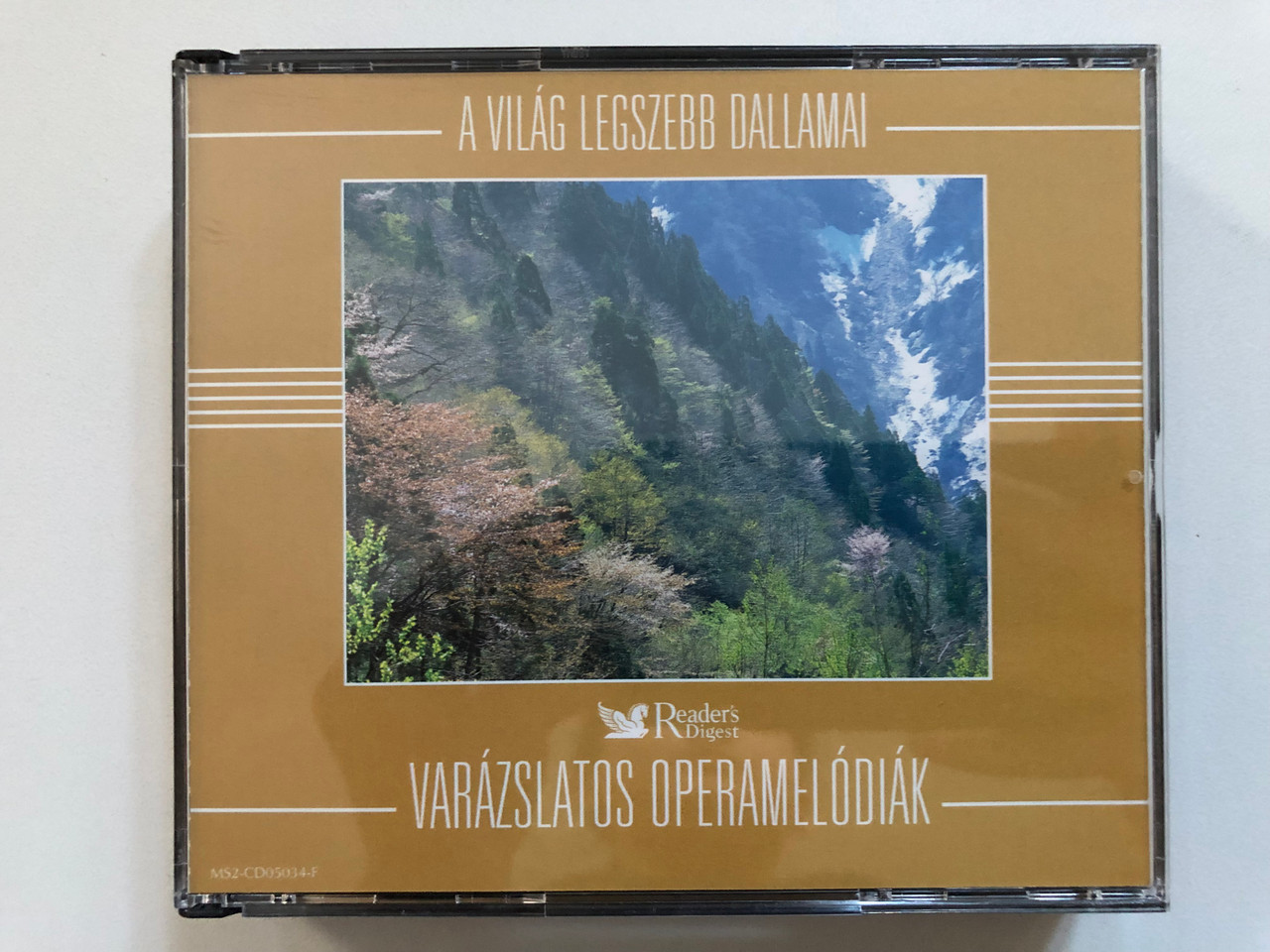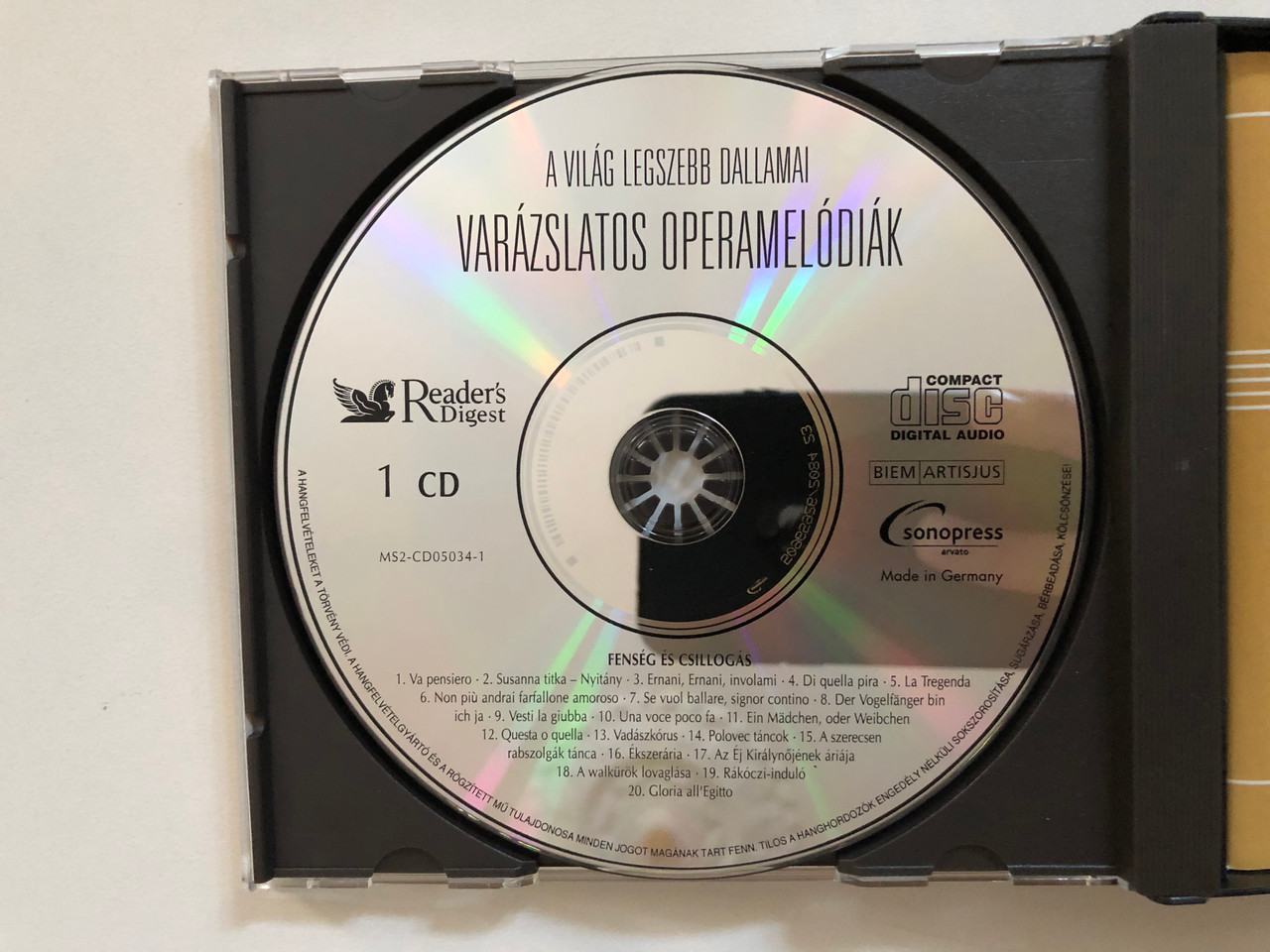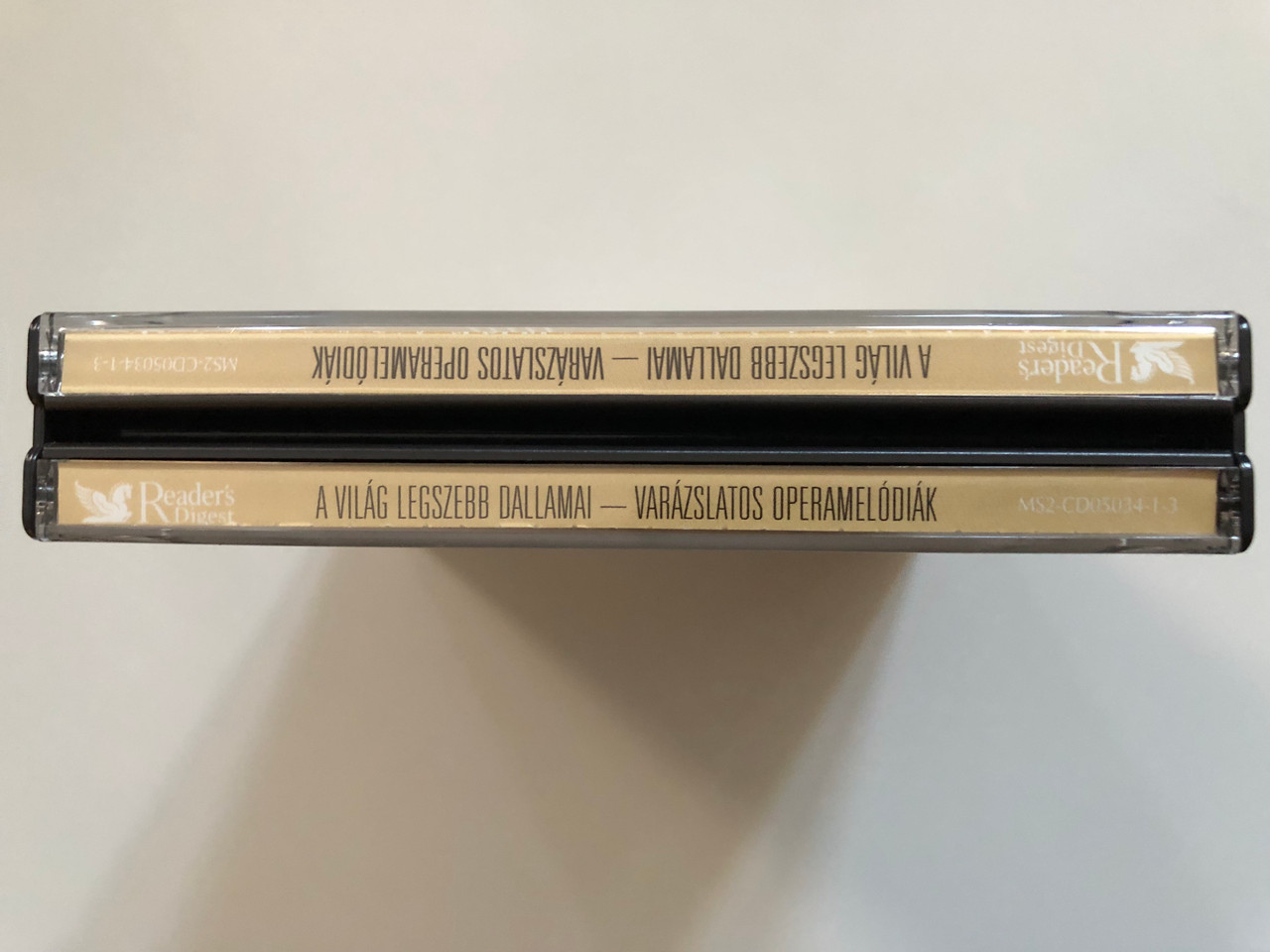Description
A Világ Legszebb Dallamai: Varázslatos Operamelódiák | Magical Opera 3-CD Melodies Collection
Product Information
- Catalog Number: MS2-CD05034-F
- UPC: MS2-CD05034-8
- Product Type: Music CD Box Set
- Genre: Classical Opera
- Format: 3-CD Collection
- Total Tracks: 62 tracks across three discs
- Release Date: 2005
- Publisher: Reader's Digest Kiadó Kft.
- Language: Hungarian (track titles and packaging)
- Performers: Various orchestras and opera singers
- Theme: Famous opera arias, duets, choruses, and instrumental pieces
Overview
"A Világ Legszebb Dallamai: Varázslatos Operamelódiák" (The World's Most Beautiful Melodies: Magical Opera Melodies) is an exquisite 3-CD collection showcasing the most beloved treasures from the operatic repertoire. This carefully curated Reader's Digest compilation presents famous arias, overtures, choruses, and instrumental interludes organized into three thematic discs: majesty and brilliance, love and romance, and timeless favorites. From Verdi's powerful "Va pensiero" and Mozart's playful "Der Vogelfänger bin ich ja" to Puccini's passionate "E lucevan le stelle" and Bizet's seductive "L'amour est un oiseau rebelle," this collection spans the full emotional range of opera's dramatic world. Whether you're an experienced opera enthusiast or a newcomer to classical vocal music, these selected highlights provide a perfect introduction to the magnificent world of opera through its most accessible and emotionally stirring moments.
Magyar nyelvű áttekintés (Hungarian Overview)
A "Világ Legszebb Dallamai: Varázslatos Operamelódiák" egy kiváló 3 CD-s gyűjtemény, amely az operairodalomból válogat össze népszerű kincseket. Ez a gondosan összeállított Reader's Digest válogatás híres áriákat, nyitányokat, kórusműveket és hangszeres közjátékokat tartalmaz három tematikus lemezre osztva: fenség és csillogás, szerelem és romantika, valamint örök kedvencek. Verdi erőteljes "Va pensiero" kórusától és Mozart játékos "Der Vogelfänger bin ich ja" áriájától kezdve Puccini szenvedélyes "E lucevan le stelle" dallamáig és Bizet csábító "L'amour est un oiseau rebelle" áriájáig, ez a gyűjtemény felöleli az opera drámai világának teljes érzelmi skáláját. Akár tapasztalt operarajongó, akár a klasszikus vokális zene új hallgatója, ezek a válogatott kiemelések tökéletes bevezetést nyújtanak az opera csodálatos világába annak leginkább hozzáférhető és érzelmileg megindító pillanatain keresztül.
Product Features
- Thematic Organization: Three carefully curated discs with specific emotional themes
- Composer Diversity: Features works by Verdi, Mozart, Puccini, Wagner, Bizet and more
- Vocal Variety: Includes arias for soprano, tenor, baritone, and bass voices
- Ensemble Selections: Features duets, choruses, and orchestral pieces
- Historical Range: Spans Classical, Romantic, and early modern operatic periods
- Linguistic Diversity: Includes pieces in Italian, German, and French
- Dramatic Contrast: From powerful dramatic moments to tender love scenes
- Informative Booklet: Detailed program notes in Hungarian
- Professional Performances: High-quality recordings by accomplished singers and orchestras
- Elegant Packaging: Attractive design by Csilla Farkas
Interesting Facts
The Opera's Universal Emotional Language
This collection showcases opera's remarkable ability to communicate profound human emotions across cultural and linguistic boundaries. Though many listeners may not understand the Italian, German, or French lyrics without translation, the expressive power of these pieces transcends their verbal content. Puccini's "E lucevan le stelle" from Tosca conveys the protagonist's desperate longing and impending doom through its poignant melody and orchestration, making the emotional content clear even without understanding the text. Similarly, Verdi's "Va pensiero" (Chorus of the Hebrew Slaves) from Nabucco became a powerful symbol of Italian national identity and yearning for freedom during the Risorgimento, despite its biblical context. The collection demonstrates how composers use musical techniques—tempo changes, major/minor shifts, orchestral coloring, and melodic contours—to create an emotional language that speaks directly to the heart. These works have endured for centuries precisely because they express universal human experiences—love, jealousy, joy, despair—in a way that remains accessible regardless of the listener's linguistic or cultural background.
Opera as Cultural Revolution
Many of the pieces in this collection were revolutionary in their time, challenging social norms and artistic conventions. Mozart's "The Magic Flute" (represented by "The Queen of the Night's Aria") incorporated Enlightenment ideals about reason and human brotherhood that were politically controversial when it premiered in 1791. Verdi's choruses like "Va pensiero" carried coded political messages that Italian audiences immediately recognized as calls for national unification and liberation from foreign rule. Wagner's innovations (represented by "Ride of the Valkyries" and the "Evening Star" aria) created a new approach to opera that broke from traditional structures and influenced all subsequent classical music. Bizet's "Carmen" (represented by "L'amour est un oiseau rebelle") shocked its first audiences with its realistic portrayal of working-class characters and unrestrained sexuality. Even Puccini's "La Bohème" (represented by "Che gelida manina") was revolutionary in focusing on the everyday lives and struggles of ordinary young people rather than mythological or royal figures. This collection thus documents not just beautiful melodies but moments of artistic innovation that reflected and sometimes accelerated social change.
The Voice as Supreme Instrument
This collection highlights why the operatic voice has been considered the ultimate musical instrument—capable of expressive possibilities beyond what any mechanical instrument can achieve. The vocal selections showcase the remarkable diversity of the human voice, from the stratospheric coloratura required for Mozart's "Queen of the Night" aria (reaching an F6, two and a half octaves above middle C) to the rich bass depths of "Madamina, il catalogo è questo." The collection includes examples of different vocal techniques that developed in various national traditions: the fluid bel canto style in Bellini's "Prendi, l'anel ti dono," the dramatic declamation of Wagner's "Evening Star" aria, and the verismo emotional directness of Puccini's "Vissi d'arte." Perhaps most impressive are the duets like the Cherry Blossom Duet from "Madama Butterfly," which demonstrate how composers could create complex emotional interactions between characters through intertwining vocal lines. These selections remind listeners that despite technological advances in sound reproduction, nothing has surpassed the emotional impact of the well-trained human voice in expressing the full range of human feeling.
Opera's Cultural Legacy
The pieces in this collection have permeated broader culture far beyond the opera house. Wagner's "Ride of the Valkyries" has appeared in numerous films, most famously "Apocalypse Now," and has been referenced in countless advertisements and cartoons. The "Habanera" from Bizet's Carmen ("L'amour est un oiseau rebelle") has been adapted for everything from figure skating routines to car commercials. Puccini's "O mio babbino caro" (represented by themes from Gianni Schicchi) became internationally famous when used in the film "A Room with a View." These operatic moments have become part of our shared cultural vocabulary, appearing in unexpected contexts that would likely amaze their original composers. The collection also includes pieces with significant cultural resonance beyond their musical qualities—Verdi's "Rákóczi March" has particular historical importance in Hungary as a symbol of national identity, while the "Polovtsian Dances" from Borodin's "Prince Igor" introduced Western audiences to musical themes inspired by Central Asian traditions. This cultural permeation demonstrates how these operatic creations transcended their original theatrical contexts to become enduring touchstones of world culture.
Publishers
Published by Reader's Digest Kiadó Kft., Budapest, 2005. The recordings are owned by Reader's Digest Association. All rights reserved. Copyright © Reader's Digest Kiadó Kft., Budapest, 2005. Reproduction or republication of any part of this compilation is prohibited. Design by AMICUS Stúdió and Csilla Farkas.
We value your feedback! Share your experience with this product to help others make informed decisions. Your review is important to us!
Hashtags
#OperaMelodies #OperaClassics #VerdiArias #MozartOpera #PucciniHighlights #ClassicalVocal #OperaFavorites #OperaHighlights #WagnerSelections #BestOfOpera
Magyar címkék (Hungarian Hashtags)
#OperaMelódiák #OperaKlasszikusok #VerdiÁriák #MozartOpera #PucciniKiemelések #KlasszikusVokál #OperaKedvencek #OperaVálogatás #WagnerMűvek #OperaLegjobbjai


























